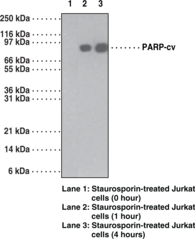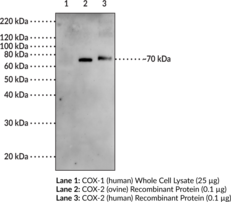Description
The poly(ADP-ribose) polymerase (PARP) is involved in cell recovery from DNA damage, such as methylation of N3-adenine, which activates the base excision repair process. PARP is a 116 kDa nuclear chromatin-associated enzyme that is cleaved during apoptosis by caspase-3 into a 24 kDa fragment containing the DNA binding domain and an 89 kDa fragment containing the catalytic and automodification domains. The 24 kDa fragment irreversibly binds to DNA and may contribute to the irreversibility of apoptosis by blocking the access of DNA repair enzymes to DNA strand breaks.
Synonyms:
Immunogen: synthetic peptide containing amino acids near the 214/215 cleavage site of human PARP
Formulation: 100 µg protein G-purified IgG in 200 µl PBS containing 0.05% BSA and 0.05% sodium azide
Isotype: IgG2bκ
Applications: WB and FC (intracellular)
Origin: Animal/Mouse
Stability: 365 days
Application|Flow Cytometry||Application|Western Blot||Product Type|Antibodies|Monoclonal Antibodies||Research Area|Cancer|Cell Death|Apoptosis||Research Area|Cancer|DNA Damage and Repair||Research Area|Epigenetics, Transcription, & Translation|Writers|DNA/RNA Methylation


